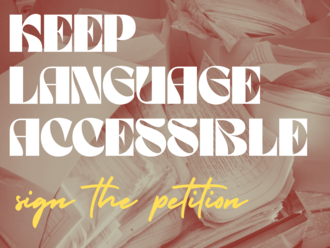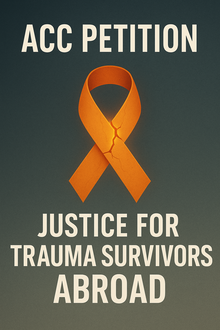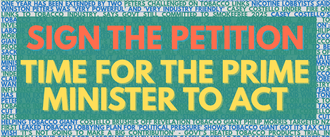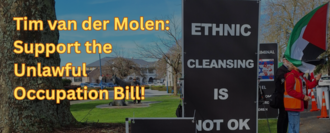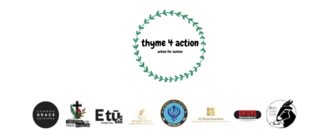-
Stop the repeal of the Plain Language Act 2022Aotearoa should be a place where people are encouraged and supported by their government to engage in democratic processes. Where usage of plain language in documents is encouraged, and people have the ability to understand their rights within seconds no matter where they come from or what their background is. Right now our government has chosen to treat accessible language differently to other equitable measures by excluding Plain Language from their budget. Although plain language is a less tangible concept, the importance of it to people across Aotearoa is no less vital than having wheelchair ramps in public buildings, or sign language interpreters during emergency broadcasts. Simple, easy to read language helps our more vulnerable groups in Aotearoa to receive fair treatment in all sectors of government. Over 1.3 million adult New Zealanders have low literacy/numeracy skills, with Māori and Pacific peoples significantly overrepresented in this group. This leads to higher barriers in employment, health, income, and civic engagement for these communities[1]. Furthermore, up to 10% of New Zealanders have communication issues, including difficulties that directly affect reading, writing, or understanding official information. There are also more than 11,530 children with swallowing difficulties, 95,000 people with autism, and 60,000 children with auditory processing disorder, all conditions that can impact effective engagement with complex or non-plain language content[2]. Plain language is also a vital tool for older generations, many of whom are navigating digital systems and filling out important forms independently, often without someone to assist them. Keeping Plain Language requirements in legislation means everyone is considered when the government publishes information. By taking it away, the government is forgetting why it was put into place: to keep all of us in the loop. No one should have to spend hours filling out and decoding benefit forms, immigration forms, justice information, or health information. The budget we pay for should work for us, too. Now is the time for us to take action that will protect our most marginalised brothers and sisters. Action that allows for everyone to be part of the conversation, and puts equitable care at the heart of our government's services. References: 1. An Empirical Portrait of New Zealand Adults Living With Low Literacy and Numeracy Skills. AUT NZ Pathways Research Institute. 2022: https://nzpri.aut.ac.nz/__data/assets/pdf_file/0008/522827/An-empirical-portrait-of-New-Zealand-adults-living-with-low-literacy-and-numeracy-skills_report.pdf 2. Communication and Swallowing Disabilities in New Zealand: Data Fact Sheet 2023. Speech-language Therapists New Zealand. 2023: https://speechtherapy.org.nz/assets/Uploads/SLT-Business-Case-2024/Communication-and-Swallowing-Disabilities-in-New-Zealand-Data-Fact-Sheet.pdf?vid=41,913 of 2,000 SignaturesCreated by Connie Bachle
-
Protect the National Flag of Tonga from Unauthorized Commercial UseThe Flag of the Kingdom of Tonga is a sacred emblem of our nation’s identity, sovereignty, and unity. It embodies the sacrifices of our ancestors, the pride of our people, and the values enshrined in our Constitution. While the Constitution and the Tonga Royal Arms and Flag Act (1962) protect the flag from alteration, there is currently no law preventing its use on commercial products without the consent of the Government of Tonga. As a result, the flag has been used by private companies, often overseas, for profit, without respect for cultural significance and without benefit to the people of Tonga. Our Concerns • Cultural integrity: The flag is being printed on merchandise that contradicts cultural beliefs and values such as footwear, some apparel, and novelty items, diminishing its dignity. • Economic loss: Profits from these items often flow offshore, with no return to Tonga’s economy or people. • Lack of legal recourse: Current laws do not cover the commercial exploitation of the national flag. We call on the Government of Tonga to: 1. Amend the Copyright Act 2002 to include explicit protection for the national flag, prohibiting its use for commercial purposes without prior government consent. 2. Amend the Tonga Royal Arms and Flag Act (1962) to extend similar protections to the national flag as are afforded to the Royal Ensign and Coat of Arms. 3. Establish a licensing and approval process for any commercial use of the flag, ensuring such use aligns with cultural values and national interests. 4. Introduce enforcement mechanisms and appropriate penalties for unauthorized commercial use, both domestically and internationally, where possible. 5. Launch a public awareness campaign to educate businesses and the public about the proper and respectful use of the national flag. International Precedents Other nations have successfully implemented legal protections for their flags and culturally significant symbols, including: • Australia: Copyright protection and licensing for the Aboriginal flag. • Canada: Prohibits commercial use of the national flag without consent. • South Africa: Trademark protection of the flag’s design. WIPO (SA), Gov.Za, fiav.org Tonga can adopt a similar approach to safeguard our national symbol. The Tongan flag is a national symbol of indigeneity and sovereignty of identity. This is not a logo for sale; it is a living symbol of our heritage, sovereignty, and shared future. We, the undersigned, urge the Government of Tonga to act decisively to protect it for generations to come.86 of 100 SignaturesCreated by Tapa Talanoa
-
Women, girls & people assigned female at birth with Endo deserve better: Demand guideline review nowNo matter who we are, or where we come from, we all deserve to live a life of dignity, free of pain and struggle. A life where we are believed and we have access to the care that we need. However, there are thousands of us every day who live in the abrupt edges of medical understanding and right now, there are far too many women, girls, and people assigned female at birth are being dismissed, misdiagnosed, or denied access to the care and support they need. [3][6]. At least one in seven women, girls, and people assigned female at birth in Aotearoa live with endometriosis (mate kirikopu), a chronic and often disabling inflammatory condition that causes pelvic pain, fatigue, infertility, and damage to multiple organs [1][10]. Despite this, most with endometriosis (mate kirikopu)are not being taken seriously by our health system. The national endometriosis (mate kirikopu) guidelines, last released in 2020 by the Ministry of Health, were never intended to be formal clinical guidance [11]. They are not mandatory, they are missing key protections, and they are letting them fall through the cracks. The current guidelines are not fit for purpose, they are outdated, non-binding, and were never designed to function as formal clinical guidelines. In practice, this leaves women, girls, and people assigned female at birth with endometriosis (mate kirikopu) facing inconsistent care, delayed diagnoses, and limited access to the treatment they need to live full, healthy lives. The current guidance lacks clear timeframes for action, formal referral pathways, youth-specific approaches, accountability mechanisms, and adequate inclusion of Māori, Pasifika, LGBTQIA+, and disabled communities. Too often, those with endometriosis (mate kirikopu) are passed between GPs and emergency departments for years without answers. The average time to diagnosis in Aotearoa is still 7 to 10 years [2][7]. That means they are missing school, losing jobs, giving up dreams of having tamariki, or falling into depression and isolation before they are even believed [3][5][6]. For marginalised groups, the situation is even worse. Young people, Māori, Pasifika, disabled and gender-diverse people are more likely to be dismissed, misdiagnosed, or denied access to care. [3][6]. That means many healthcare providers don’t follow it, and there are no consequences when patients are ignored, misdiagnosed, or left untreated. We need more than just suggestions. We need mandatory, enforceable standards that every health provider in Aotearoa must follow. We need guidelines that uphold mana, affirm lived experience, and work for all, not just a privileged few who can afford private care or know how to fight the system. Studies show that: • The impacts of Endometriosis (mate kirikopu) go far beyond physical pain, impacting mental health, daily functioning, and overall wellbeing with those affected • Up to 98% of women, girls, and people assigned female at birth with endometriosis (mate kirikopu) experience symptoms of depression, and around 87% experience anxiety [1]. These mental health struggles are often made worse by diagnostic delays, medical gaslighting, and lack of access to effective treatment and support [2][3]. • Women, girls, and people assigned female at birth with endometriosis (mate kirikopu) report a significantly reduced quality of life compared to the general population, especially in the areas of physical function, emotional wellbeing, sexual health, and work productivity [4][5]. This is not just due to pain, but also the psychological toll of being dismissed, misdiagnosed, or ignored by the healthcare system [3][6]. • Research also shows that youth with endometriosis (mate kirikopu)-like symptoms are often told their pain is normal, resulting in long-term harm to mental health, school attendance, and body trust [7]. Without guidelines that address these impacts holistically and offer clear, equitable pathways to care, women, girls, and people assigned female at birth will continue to fall through the cracks. We need guidelines that work in real life, not just on paper. A community-led review by Endo Warriors Aotearoa and our Youth Advisory Board outlines how the current guidance fails us. It shows the harm caused by relying on hormonal contraception as the default treatment [3] [6], how hard it is to access skilled excision surgery [2] [7], and how little support exists for holistic or culturally grounded pain management [3]. He wā tēnei. It is time. Sign the petition today and stand with our hāpori to demand a new standard of care for endometriosis (mate kirikopu) in Aotearoa, a new standard that embeds lived experience, Māori and Pasifika voices, youth insight, and gender diversity into every part of care, a health system that believes us, supports us, and works for us. References: [1] Armour, M., et al. (2019). The prevalence and impact of endometriosis symptoms on quality of life among young women: a cross-sectional study. BJOG, 126(6), 755–759. [2] Ballard, K., Lowton, K., & Wright, J. (2006). What’s the delay? A qualitative study of women’s experiences of reaching a diagnosis of endometriosis. Fertility and Sterility, 86(5), 1296–1301. [3] Culley, L., et al. (2018). The social and psychological impact of endometriosis on women’s lives: A critical narrative review. Human Reproduction Update, 24(6), 625–639. [4] Riazi, H., et al. (2014). Clinical diagnosis of pelvic endometriosis: a scoping review. BMC Women’s Health, 14(1), 73. [5] Jones, G., Jenkinson, C., & Kennedy, S. (2004). The impact of endometriosis on quality of life: a qualitative study. BJOG, 111(4), 410–418. [6] Denny, E., & Mann, C. H. (2007). Endometriosis and the primary care consultation. Eur J Obstet Gynecol Reprod Biol, 132(2), 224–228. [7] Missmer, S. A., et al. (2014). Incidence of laparoscopically confirmed endometriosis by demographic, anthropometric, and lifestyle factors. Am J Epidemiol, 179(6), 721–730. [8] Missmer, S. A., et al. (2014). Incidence of laparoscopically confirmed endometriosis by demographic, anthropometric, and lifestyle factors. Am J Epidemiol, 179(6), 721–730. [9] Zhang, T., et al. (2020). The link between endometriosis and autoimmune diseases. Frontiers in Immunology, 11, 339. [10] Ministry of Health. (2020). Diagnosis and Management of Endometriosis in New Zealand. Wellington: Ministry of Health. “While not a formal clinical guideline, it provides a consensus view of best-practice principles.” (p. 2)5,946 of 6,000 SignaturesCreated by Endo Warriors Aotearoa
-
Justice for Trauma Survivors Abroad: ACC Must Fund Counselling for All Sensitive ClaimantsNo matter who we are or where we come from, we all deserve to heal with dignity and safety at its core. For survivors of trauma, access to services that nurture healing in a healthy way are paramount - and this support shouldn’t end at our borders. I’m a survivor of trauma with an accepted sensitive claim under ACC. But the moment I left New Zealand — for safety, for healing, for survival — ACC cut off my access to the counselling I was promised.I’m transgender, disabled, and neurodivergent. Trauma support isn’t optional for me. It’s survival. ACC’s current policy is cruel. It forces people like me to fly back to Aotearoa — sometimes at great risk — just to be reassessed for support we’ve already been approved for. Others have been left without any care at all, as if their pain matters less once they leave the country. I know I’m not the only one. I know there are others — Māori survivors, queer survivors, disabled survivors — who’ve been silenced, cut off, and left to suffer in silence overseas. This matters because trauma doesn’t respect borders, and neither should care - sign this petition and together we can make a change!10 of 100 SignaturesCreated by Kelly Lynch

-
Healthy Homes for Dunedin StudentsWe all deserve to have safe, affordable and secure places to call our home. But for the people of Dunedin, landlords are lining their pockets and regularly getting away with squalid housing conditions, far from meeting Healthy Homes Standards. The consequences of inadequate housing can be far reaching, affecting people’s health and wellbeing. Many students also suffer from sicknesses, due to the cold, damp and unsafe environments in flats. It’s time for landlords to take responsibility for the properties they profit from. Students shouldn’t have to choose between affordable rent and safe living conditions. The Healthy Homes standard sets out compliance obligations with respect to keeping homes warm, dry and safe. These standards aren’t enough to be written on a piece of paper. They must be enforced by the MBIE.31 of 100 SignaturesCreated by Jackson Phillips
-
Protect Our Vote: Stop Voter SuppressionMost people in Aotearoa, no matter our background, income or postcode, value fairness and freedom. The freedom to have a say in decisions that impact our lives — from making housing more affordable, to creating jobs to making health care decent. We want everyone to have the freedom to vote as we know for our democracy to work for all of us, it must include all of us. We are proud to have been the first democracy where women could vote. But right now, the Government is pushing through changes to the Electoral Act that will make it harder for many people to vote—especially those already underrepresented in our political system. These proposed changes include: • Scrapping same-day enrolment and voting on Election Day, a clearly effective measure for increasing turnout - used by over 80,000 people in the last election. • Requiring strict forms of ID to vote, which puts unnecessary and expensive barriers up particularly for those on low incomes or experiencing homelessness. • Shortening the voter enrollment deadline by a full week, which will target people with busy lives or housing instability. • Banning all incarcerated people from enrolling and voting in our general election. • Banning the distribution of free food and drinks near polling places, which has long been a simple, welcoming way to support voter turnout, and has the potential to impact marae specifically. Even the Government’s own Attorney-General Judith Collins has warned these changes breach the Bill of Rights and risk silencing tens of thousands of voters. She found that the reforms would likely be inconsistent with the right to vote and lacked sufficient justification[1]. At the same time, the Prime Minister has publicly admitted he does not know the details of his own government’s proposals[2]. This is unacceptable when our fundamental democratic rights are on the line. Voters pick our leaders -- leaders do not get to pick and choose their voters. Let’s be clear: this is voter suppression—and it mirrors what far-right governments around the world are doing to consolidate power by discouraging democratic participation. During their term, this Government has routinely bypassed democratic processes. In just its first 17 weeks, it passed 14 laws under urgency—without full public consultation or proper scrutiny. That’s more than many previous governments managed across an entire term[3]. If we let these electoral law changes go ahead, we risk silencing over a hundred thousand voters[4] at the next election —and setting a dangerous precedent. We call on the Government to immediately: • Stop all changes that limit or restrict the ability of people to enrol or vote. • Retain same-day enrolment and voting on Election Day. • Reject strict voter ID laws that disproportionately impact Māori, young people, disabled voters, and others and will suppress voter turnout. • Allow food and drink near polling places as a basic gesture of hospitality, tikanga Māori and community support. • Commit to transparent, robust public consultation before any electoral law changes are made. • Explore and commit to removing other barriers currently preventing people from voting. For our democracy to work for all of us, it must include all of us. We need our leaders to be removing barriers stopping people voting, not creating new ones. References: 1. Attorney-General rules her own govt’s voting crackdown breaches human rights — Newsroom, 28 July 2025 2. Christopher Luxon defends voting changes after Judith Collins raises problems — RNZ, 27 July 2025 3. Urgency under scrutiny as pay equity changes rushed through — 1News, 11 May 2025 4. New Zealand attorney general warns her government’s electoral reform could breach human rights law — The Guardian, 28 July 202510,483 of 15,000 SignaturesCreated by Grace Newton
-
Demand the Prime Minister strip the tobacco and vaping portfolio from NZ FirstAs a coalition of health organisations and advocacy groups, we are calling on the Prime Minister Luxon: strip the tobacco and vaping portfolio from New Zealand First. It's the responsibility of leaders in government to make informed decisions that have long-term benefits for the future of the country and the health of its people. They should use the best knowledge, information and expertise available to guide their decisions to ensure all people and communities can thrive. That is not happening right now. Keeping the tobacco industry away from influencing Government decisions and actions is crucial to protecting people’s health and wellbeing. Our Government appear not to be prioritising saving lives and protecting people from harmful industries who have caused so much death and destruction in their pursuit of profits. If action isn’t taken now, more decisions will continue to be made behind closed doors that are influenced by the tobacco and vape industry which benefits their interests. The health of people across Aotearoa is under threat if the PM doesn’t take some action to change how health decisions are being made and who is responsible for that decision making. We are calling for PM Christopher Luxon to take a strong stance and protect the health of all people in Aotearoa. Sign this petition to show your support! References: [1] Alleged ties between NZ First and vaping companies a 'dangerous risk' to New Zealanders, anti-vape group warns | RNZ News734 of 800 SignaturesCreated by Vape-Free Kids NZ

-
MP Tim van der Molen: Support the Unlawful Occupation of Palestine Bill1.Rules based order. New Zealand supports a rules-based international order – for example through the International Court of Justice and the International Criminal Court. Israel is the world’s most egregious violator of international rules. Things have got extremely dire this last month. Gaza is a walled in community where the population cannot leave and no food or water has been allowed in since May 8 2025 [2] 2. War crimes. Unfortunately, our government has stayed silent, although it has called for a negotiated settlement in Gaza, which Israel agreed to and then has trashed. Israel agreed to a three-phase ceasefire in January this year but then refused to negotiate stage two of the agreement which would have forced it to withdraw its troops from Gaza. An arrest warrant has been issued by the International Criminal Court for Israeli Prime Minister Benjamin Netanyahu for trial on war crimes charges. [3] 3. The precedent exists: New Zealand Government has imposed sanctions before for war crimes. The Green Party bill is based on the sanctions the government has imposed on Russia for its invasion of Ukraine. Why did we sanction Russia but not Israel? 4. The New Zealand Government has spoken out before against illegal Israeli settlements and criticised IDF attacks on UN staff.[4] NZ has made it clear that Israel needs to let humanitarian aid into Gaza and for a permanent ceasefire to come into being. NZ also voted in the UN General Assembly last September to endorse the International Court of Justice ruling that Israel’s occupation of Palestinian territory was illegal and Israel must vacate Occupied Palestinian Territorywithin a year. 5. TheNew Zealand Governmen must follow the ICJ. [5]T he ruling by the ICJ requires NZ to take actions against Israel’s illegal occupation but the government has done nothing. 6 Pressure from the international community is mounting. This week alone, the Hague group 30 states from Africa, Asia, Europe, as well as North America and South America have come together for multilateral action against the Genocide in Gaza. [6] Joining Belgium, Spain and Ireland, France, the UK and Canada have now moved to recognise Palestinian statehood.[7] Why now? Starving civilians, severely malnourished children are dying daily in increasing numbers.[8] In an alert, the UN agency for Palestine refugees, UNRWA, relayed desperate testimonies from its colleagues who are also struggling to survive in the war-torn enclave. “We’re in the death phase,” one UNRWA worker said. “Everything around people at the moment is death, whether it’s bombs or strikes, children wasting away in front of their eyes from malnourishment, from dehydration, and dying.” Doctors and nurses who continue to work in the UN agency’s clinics and medical centres “are watching children disappear and die in front of their eyes, and there's absolutely nothing that they can do about it,” the worker continued. The development comes after desperate Gazans seeking aid came under fire at the weekend “from Israeli tanks, snipers and other gunfire”, according to the UN World Food Programme. [9] In a detailed statement after the incident on Sunday 20 July, it explained that a 25-truck lorry convoy crossed the Zikim border point in northern Gaza “destined for starving communities”. Shortly after passing the final checkpoint after the Zikim crossing point, the convoy encountered large crowds of civilians waiting to access food supplies. This was when the shooting began, leaving “countless” Gazans dead, WFP said, echoing reports by the health authorities. Condemning the incident, WFP noted that the victims “were simply trying to access food to feed themselves and their families on the brink of starvation”. That's why we're calling on the National party members to support the Unlawful Occupation of Palestine Bill - as your constituents, we are telling you now is the time to act. References: [1] New Zealand Parliament |Unlawful Occupation of Palestine Sanctions Bill [2] [8] Terror and chaos for Gaza’s people now entering the ‘death phase’ | UN News [3] UNRWA Commissioner-General on Gaza: The worst case scenario of famine is now happening in Gaza [4] Israel/OPT: Netanyahu, Gallant and Al-Masri must face justice at the ICC for charges of war crimes and crimes against humanity - Amnesty International [5] NZ can respond to ICJ ruling on Israel - AUT News [6] Emergency Conference of The Hague Group [7] Canada to recognise Palestine at UN general assembly, joining France and UK in push for new state | World news | The Guardian [9] Gaza Convoy Incident Statement | World Food Programme101 of 200 SignaturesCreated by Margaret Stuart
-
Kāinga Ora: Don't roll back on Rangitata homesNo matter who we are, or where we come from, people across Aotearoa deserve somewhere safe and dignified to call home. As house prices sky rocket, Aotearoa is plunged deeper into the housing crisis created by this Government, Kāinga Ora have rolled back their commitment to deliver social housing in Rangitata.[1] These homes are desperately needed for our most vulnerable citizens - more and more of whom are forced into rough sleeping as they're priced out of the private rental market and emergency housing options are stripped away. Our construction sector also needs the work it will bring in; over the past year we've lost close to a thousand local jobs with the closing of Alliance Smithfield and the loss of the Antarctica contract as examples, and the recession making times rougher across the board for everyone. We’re calling on you as our representative to ensure Kāinga Ora stays true to their commitment to the Grey Road/Arthur Street development, and to show up for your constituents when it matters not just at campaign time. References: [1] Kāinga Ora cans hundreds of social housing building projects after review, takes up to $180m hit - NZ Herald29 of 100 SignaturesCreated by Jacqui Giles
-
Call for an Immediate, Permanent Ceasefire in Gaza and Ethical Action for PalestineLocal governments have a role to play in upholding this legal framework and ensuring our cities do not profit from or contribute to the normalisation of human rights violations by dealing with the listed organisations and companies. Failure to do so would be a grave blow to the credibility of and trust in the international legal order, and to the reputation of New Zealand. Palmerston North is a proud multicultural city, and a certified Welcoming Community. We have many sister cities, in support of international peace, and our Mayor is currently the President of Sister Cities NZ. Many members of our community have whakapapa to the Arab world and are deeply affected by events in the Middle East. The Palestinian members of our community are grieving; they have all lost family and friends, and have faced decades of trauma and loss. As a city, we have historically stood for peace, social responsibility, and human rights. Our Council has ethical guidelines for its operations and procurement processes, with commitments to values such as integrity, sustainability, and inclusion. It is crucial that the Council condemns injustice wherever it occurs, in reflection of our shared ethics. We cannot claim to support women while watching Palestinian women targeted and starved. We cannot say we protect tamariki while Gaza’s children are orphaned, amputated without anaesthetic, and lie cold under rubble. We cannot support human rights while turning away from genocide. This is the test of our generation, and history will remember what we choose. While Palmerston North City Council may not currently purchase large volumes of goods directly, we call for a formal policy that ensures: • PNCC does not knowingly enter into service contracts, sponsorships, or investment arrangements with companies that profit from or are complicit in violations of international humanitarian law and human rights, including the illegal occupation of Palestinian Territory. • PNCC commits to ongoing ethical screening of procurement, investment, and funding practices, in line with its existing sustainability and social responsibility goals. • PNCC aligns future policy development with New Zealand’s obligations under international law and the rulings and advisory opinions of the ICC and ICJ. This is an ethical call, not a political call. Councils have, in the past, taken ethical positions on international issues, including condemning Russia’s invasion of Ukraine, sponsoring fundraising, and fundraising for Ukraine, and refusing procurement from companies complicit in other abuses. Likewise, the procurement policies called for in this petition are neither arbitrary nor politically biased — they are based in international law: UNSC Resolution 2334, ICJ Advisory, Opinions, and the Rome Statute and Geneva Conventions, which prohibit aiding and abetting war crimes or occupation. Councils have a duty to not support or engage with entities complicit in these crimes, especially as the ICJ and ICC are now actively investigating crimes against humanity and plausible genocide. Across Aotearoa New Zealand, local authorities have begun taking action. Far North, Whanganui, Nelson, and Dunedin City Councils have passed motions calling for a ceasefire in Gaza and to uphold Palestinian human rights. In addition, Nelson and Christchurch City Councils have amended their procurement policies to comply with UNSC Resolution 2334 and not contract with the list of companies identified by the UN Human Rights Council as being involved in the building, maintenance, or consolidation of illegal Israeli settlements (as has Environment Canterbury Regional Council). Dunedin City Council’s Community Services Committee has recommended that their Council support the Unlawful Occupation of Palestine Sanctions Bill proposed by the Green Party, and supported by the Labour Party and Te Pāti Māori. This movement is part of a wider global effort. Hundreds of city councils worldwide (including in Australia, USA, Spain, Ireland, Italy, Turkey, and Belgium) have passed motions calling for a ceasefire, to divest from companies complicit in Israel’s violations of Palestinians’ human rights, and/or to end Sister City relationships. In light of the above, we urge Palmerston North City Council to pass the following motions: CEASEFIRE MOTION That Palmerston North City Council: 1. Expresses grave concern at the continuing loss of life in Gaza and Israel, and calls for an immediate and permanent ceasefire; 2. Condemns all acts of violence against civilians, and calls for the immediate release of all Israeli and Palestinian hostages held unlawfully; 3. Calls on the Government of Aotearoa New Zealand to actively support a permanent ceasefire, uphold ICJ rulings, and fulfil its legal obligations under international law, including UNSC Resolution 2334. ETHICAL PROCUREMENT MOTION That Palmerston North City Council formally adopts and enacts an ethical Procurement and Investment Framework that: 1. Incorporates respect for human rights, international law, and peacebuilding as key criteria in decision-making; 2. Screen suppliers, contractors, and investment partners for involvement in serious human rights violations, including those identified by the United Nations and international courts, UNSC Resolution 2334, and the 2004 and 2024 ICJ rulings on the wall and settlements, ensuring that Council resources are not used in ways that contribute to the occupation or related violations. Passing these motions would place Palmerston North City Council among the ethical leaders of local government in Aotearoa New Zealand, building on its commitment to sustainability and social justice.1,360 of 2,000 SignaturesCreated by thyme4action
-
Swap Out SodaStreamEveryone is entitled to live with justice and dignity, this includes Palestinians. These rights are often protected by both national and international laws. Israel is occupying and colonising Palestinian land, discriminating against Palestinians working in Israeli society, and denying Palestinian refugees the right to return to their homes. While political leaders and governments shirk their obligations, far too many corporate entities have profited from Israel’s economy of illegal occupation, apartheid and now, genocide. “It’s time for businesses to cut ties with Israel. The very fact of engaging in something that concerns and translates into economic gain and profits, it’s problematic, lest, companies and their executives are ready to face responsibility and even criminal liability” - Francesca P. Albanese, UN Special Rapporteur on the Occupied Palestinian Territories While the government is stalling on imposing sanctions on Israel, we the people will use our consumer power to “push for better” and de-shelve SodaStream from all retailers around the motu. Why SodaStream Historical Complicity SodaStream’s first factory was built over the remains of seven destroyed Palestinian villages in the illegal settlement of Ma'ale Adumim, in the occupied West Bank. Settlements like Ma'ale Adumim, and companies operating in them, are illegal under international law. In 2014, under constant pressure from the global Boycott, Divestment, Sanctions (BDS) movement, SodaStream shut down its West Bank factory. This was a big win. However, SodaStream CEO Daniel Birnbaum claimed: “We are not giving in to the boycott. We are Zionist." He framed the move as a cost-saving decision, despite accusing the BDS campaign of hurting opportunities for Palestinian workers. New Factory, Still Profiting from Apartheid After leaving the West Bank, in 2015 SodaStream relocated to the Idan Industrial Zone in the Naqab (Negev) desert. This is land that Israel confiscated from Palestinian Bedouin communities in the 1950s. That is, SodaStream is still implicated in settler colonial dynamics — just in a different region. The SodaStream factory is located near the city of Rahat where many Palestinian Bedouins were forcibly relocated. Today, Palestinian Bedouins live under constant threat of displacement by the Israeli state. Across the Naqab, hundreds of Palestinian homes are demolished every year, with the second-highest number of them occurring in Rahat. (176 in 2022 alone). These home demolitions as well as systematic exclusion from basic infrastructure and services, all contribute to Israel's long-term plan to remove them from their land and traditional practices. SodaStream and other Israeli and international companies receive government financial incentives and subsidies when they base their factories in the Naqab region. The region has been designated a ‘national priority area’ in accordance with Israel’s ten-year “National Strategic Plan for the Negev”, designed to tighten the Israeli state’s hold on the region, and vastly increase the Israeli population there. SodaStream can thus be seen as an instrument of Israel’s plan to remove indigenous people from their land through urbanisation and industrialisation. Exploitation of Palestinian Workers Over 100,000 Palestinians work in Israel and settlements—because their own economy is strangled by occupation and Israeli labour laws are not fairly applied to Palestinian workers. A 2022 report by Kav LaOved (an Israeli workers' rights NGO) found that many Palestinian workers face wage theft, unsafe working conditions, denial of health care or accident compensation, long hours without rest or proper documentation. SodaStream uses its employment of Palestinians as a public relations tool, portraying itself as a “coexistence” model while hiding the broader apartheid context that underlies the company’s operation, and which created those economic dependencies in the first place. BDS Works! We’ve seen SodaStream shutdown its illegal factory in the Occupied West Bank due to BDS pressure. In the UK, we recently saw The Co-operative Group vote to remove Israeli products from its shelves. McDonald’s has missed sales targets, Starbucks slashed its annual sales forecast after a slump in growth, Turkey’s parliament voted to remove Coke from the shops and restaurants on its grounds - we can use our collective consumer power to create change. References: https://www.whoprofits.org/publications/report/120 https://electronicintifada.net/content/new-sodastream-factory-could-help-destroy-bedouin-agriculture/13182 https://www.aljazeera.com/economy/2015/9/25/sodastream-factory-shows-palestinian-bedouins-plight https://www.bdsmovement.net/news/sodastream-close-illegal-settlement-factory-response-growing-boycott-campaign https://www.npr.org/sections/parallels/2016/03/27/471885452/when-500-palestinians-lose-their-jobs-at-sodastream-whos-to-blame1,070 of 2,000 SignaturesCreated by Swap Out SodaStream BDS Campaign

-
Keep Tokoroa Toi Ohomai OPENNo matter where we live in Aotearoa our communities need access to essential services, education and opportunities to grow and thrive. That includes Tokoroa and other small regional communities throughout the South Waikato. But as a result of this Government’s decisions Tokoroa’s Toi Ohomai campus is facing closure. The Toi Ohomai Institute of Technology has published a proposal to cut over 160 jobs which would lead to the purpose built campus in Tokoroa being closed. Toi Ohomai has said the proposal was in response to a Government expectation to become “financially viable”. Tokoroa has already faced the devastating blow of Kinleith Mill shutting down one of its plants with 150 people losing their jobs. Families have had to reevaluate their lives in the South Waikato, with many deciding to move out of the district for more job opportunities. Some have decided to stay, looking into retraining at Toi Ohomai or seeking employment in other areas in the district. The Toi Ohomai campus in Tokoroa is a beacon of light for those who otherwise wouldn't have the means to travel to continue tertiary education in Rotorua, Tauranga or Hamilton. The campus and its courses are an asset to all ages, from young high school graduates to adult learners looking to upskill or retrain. With new housing developments and the Maraetai Road Business Park build, there is a light at the end of the economic recovery tunnel for Tokoroa and the wider South Waikato. If Toi Ohomai remains open in Tokoroa, it has the potential to become a significant economic catalyst for local businesses and the recruitment and retention of young people in the district. If we lose Toi Ohomai in Tokoroa, opportunities for locals will once again become extremely limited and the wider community will be left with the burden to fill the gaps. To creatively and collaboratively invest in our local community and allow time for possibilities to flourish is to contribute to the growth and vibrancy of the South Waikato and provide hope to future generations. "Patience is bitter, but its fruit is sweet". Sign this petition to signal to Toi Ohomai and the government that the Tokoroa community deserves better and will not stand by as our opportunities for youth and future generations are shortsightedly taken away. Let’s show Toi Ohomai leadership that the Tokoroa campus is a valued asset in the community and it must stay open.246 of 300 SignaturesCreated by Elvisa Van Der Leden

